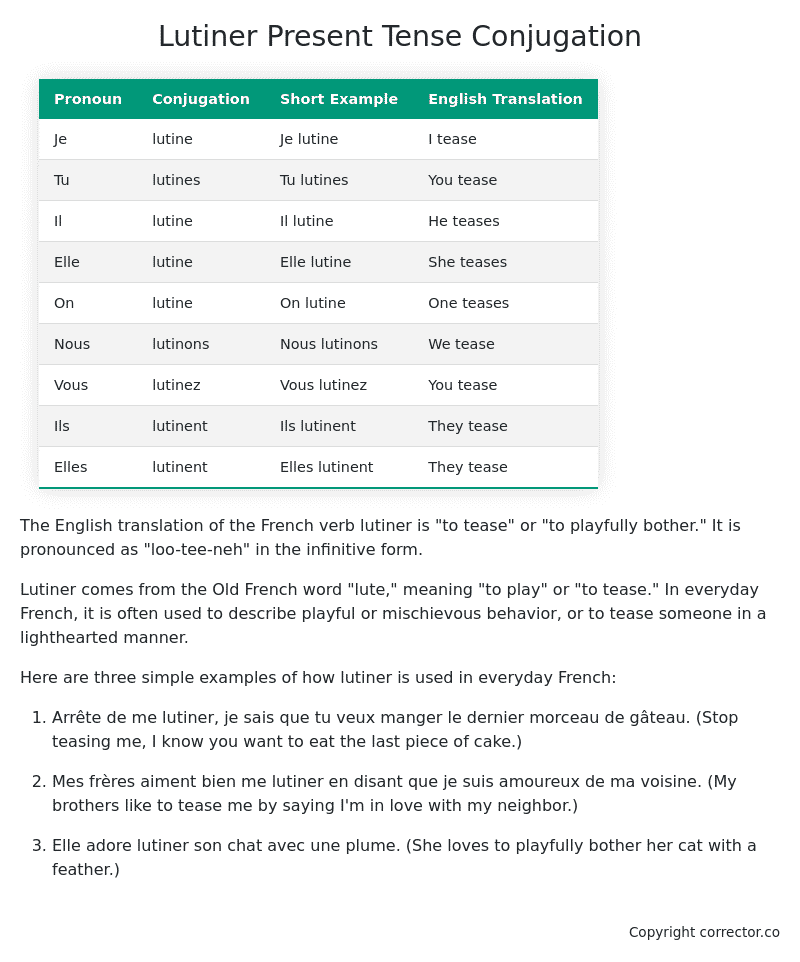Le Present (Present Tense) Conjugation of the French Verb lutiner
Introduction to the verb lutiner
The English translation of the French verb lutiner is “to tease” or “to playfully bother.” It is pronounced as “loo-tee-neh” in the infinitive form.
Lutiner comes from the Old French word “lute,” meaning “to play” or “to tease.” In everyday French, it is often used to describe playful or mischievous behavior, or to tease someone in a lighthearted manner.
Here are three simple examples of how lutiner is used in everyday French:
-
Arrête de me lutiner, je sais que tu veux manger le dernier morceau de gâteau. (Stop teasing me, I know you want to eat the last piece of cake.)
-
Mes frères aiment bien me lutiner en disant que je suis amoureux de ma voisine. (My brothers like to tease me by saying I’m in love with my neighbor.)
-
Elle adore lutiner son chat avec une plume. (She loves to playfully bother her cat with a feather.)
Lutiner – About the French Present Tense
To take a deep dive into all the French tenses then see our article on Mastering French Tense Conjugation.
Common Everyday Usage Patterns For Le Present
Interactions with Other Tenses
Table of the Present Tense Conjugation of lutiner
| Pronoun | Conjugation | Short Example | English Translation |
|---|---|---|---|
| Je | lutine | Je lutine | I tease |
| Tu | lutines | Tu lutines | You tease |
| Il | lutine | Il lutine | He teases |
| Elle | lutine | Elle lutine | She teases |
| On | lutine | On lutine | One teases |
| Nous | lutinons | Nous lutinons | We tease |
| Vous | lutinez | Vous lutinez | You tease |
| Ils | lutinent | Ils lutinent | They tease |
| Elles | lutinent | Elles lutinent | They tease |
Other Conjugations for Lutiner.
Le Present (Present Tense) Conjugation of the French Verb lutiner (this article)
Imparfait (Imperfect) Tense Conjugation of the French Verb lutiner
Passé Simple (Simple Past) Tense Conjugation of the French Verb lutiner
Passé Composé (Present Perfect) Tense Conjugation of the French Verb lutiner
Futur Simple (Simple Future) Tense Conjugation of the French Verb lutiner
Futur Proche (Near Future) Tense Conjugation of the French Verb lutiner
Plus-que-parfait (Pluperfect) Tense Conjugation of the French Verb lutiner
Passé Antérieur (Past Anterior) Tense Conjugation of the French Verb lutiner
Futur Antérieur (Future Anterior) Tense Conjugation of the French Verb lutiner
Subjonctif Présent (Subjunctive Present) Tense Conjugation of the French Verb lutiner
Subjonctif Passé (Subjunctive Past) Tense Conjugation of the French Verb lutiner
Subjonctif Imparfait (Subjunctive Imperfect) Tense Conjugation of the French Verb lutiner
Subjonctif Plus-que-parfait (Subjunctive Pluperfect) Tense Conjugation of the French Verb lutiner
Conditionnel Présent (Conditional Present) Tense Conjugation of the French Verb lutiner
Conditionnel Passé (Conditional Past) Tense Conjugation of the French Verb lutiner
L’impératif Présent (Imperative Present) Tense Conjugation of the French Verb lutiner
L’infinitif Présent (Infinitive Present) Tense Conjugation of the French Verb lutiner
Struggling with French verbs or the language in general? Why not use our free French Grammar Checker – no registration required!
Get a FREE Download Study Sheet of this Conjugation 🔥
Simply right click the image below, click “save image” and get your free reference for the lutiner Present Tense tense conjugation!

I hope you enjoyed this article on the verb lutiner. Still in a learning mood? Check out another TOTALLY random French verb present conjugation!


